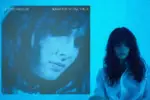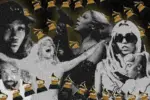In a strange twist of fate, the COVID-19 pandemic provided plenty of alone time to reflect and reminisce, and the music world certainly took advantage of it. Months of solitude allowed our favorite artists to produce a number of new songs and albums, many of which, including Glass Animals, were able to include quarantine reflections. Positive post-pandemic developments were even able to take place, as displayed by Lorde’s provocative “Solar Power.”
Artists everywhere tapped into a vulnerability and public consciousness previously undiscovered. Before, many albums seemed to promote glamour and opulence in lieu of legitimate hardship or relatable experiences. Now, this trend is taking a backseat to what listeners really want to hear: real-world phenomena.
This uplifting cultural movement is especially beautifully displayed by Clairo’s sophomore album, “Sling,” released earlier this summer. Clairo, or Claire Cottrill, the 23-year-old singer-songwriter from Carlisle, Massachusetts, is no stranger to vulnerability.
Her previous album, “Immunity,” showcased challenges navigating her sexuality and impediments on her mental health, most notably in the premiere single, “Bags.” In its chorus, “Bags” lyricizes, “Can you see me? I’m waiting for the right time / I can’t read you, but if you want, the pleasure’s all mine.” Clairo is describing her romantic feelings for her female friend, expertly capturing the fear of not only someone not liking you back but also the unique struggle for queer folks to discern whether another person is even gay at all.
The other two singles from “Immunity,” titled “Closer to You” and “Sofia,” intensify these themes: The former describes the inability to establish boundaries with emotionally abusive romantic partners, while the latter illustrates Clairo’s desire to pursue a women-liking-women relationship regardless of societal perceptions. Overall, the more upbeat bedroom pop and electropop prevalent in “Immunity” provide a striking contrast to “Sling,” which uses string accompaniments to embody a more serious tone.
Alternatively, “Sling” acutely captures a newfound understanding of upcoming adulthood and its potential for domesticity. This is something Clairo hadn’t previously addressed or publicly considered. In an interview with Apple Music, she said she began writing the album in February 2020. During quarantine, however, Clairo spent a significant amount of time at home with her family. She also adopted her dog, Joanie, during that time, which heavily influenced the album — so much so that Joanie’s dog harness, or “sling,” served as its title.
Through “Sling,” Clairo breaks away from previous industry labels as a lo-fi, bedroom pop and upbeat indie artist and curates a slow-paced, raw interpretation of her feelings. Hushed vocals accompanied predominantly by guitar and string arrangements detail the album, punctuating each song as a gentle reminder of the record’s tonality.
The album’s lead single, “Blouse,” perfectly personifies such themes. The song depicts Clairo’s experience with sexualization in the workforce and music industry. “Blouse” illustrates a typical setting for artists working with producers or studio heads: she’s “quiet at your kitchen table / with courtesy to little pet peeves / Napkins on laps, strands pulled back / I hang the scarf and my mom’s anorak.” The lyrics humanize Clairo and highlight her youth and continued attachment to her mother, giving her a certain vulnerability.
As Clairo discusses her music career with her superior, she retreats as she notices he’s only focused on her breasts and physical appearance. She sings, “Why do I tell you how I feel? / When you’re just looking down the blouse?” She then understands the game she must play in order for him to listen and continues, “It’s something I wouldn’t say out loud / If touch could make them hear, then touch me now.” Clairo succumbs to her superior and must allow him to sexualize and objectify her to avoid potential conflict and remain relevant in the industry.
Clairo further solidifies her realizations about adulthood and maturity when she explores the possibility of motherhood and domesticity in “Reaper.” She sings, “I’m born to be somebody then somebody comes from me.” Overall, though, Clairo uses “Sling” to articulate past woes tied to the music industry that caused her to neglect her personal needs. She explains this through one of the most streamed songs from the album, “Amoeba,” with lyrics like, “Could you say you even tried? / You haven’t called your family twice,” which detail her failure to keep in touch with her parents as an adult.
The organic strings and melodic piano that encapsulate “Sling” are heavily influenced by warm, dreamy and occasionally ethereal ‘70s singer-songwriters such as Carole King and Joni Mitchell. This serves as a common point of reference for Clairo; her song “Bags” lyricizes “Pour your glass of wine / Mitchell told me I should be just fine.” The latter of the lines references Joni Mitchell’s “A Case of You.”
The maturation of both Clairo’s sound and the singer-songwriter herself is evident in “Sling,” especially when juxtaposed with her previous album, “Immunity.” The lively synthpop tracks detailing premature relationships on “Immunity” cannot compare to the raw, uninhibited themes of “Sling.” Though many artists wrote quarantine tracks and albums, “Sling” more adequately represents the collective feeling that we’ve all gone through something, including those — like Clairo — who seem to have the world by the short hairs.
As her sound and maturity dramatically shift, Clairo’s lo-fi, bedroom/dream pop of pre-pandemic times become a beautiful part of the past. Understandably, the difference between a 19-year-old and a 23-year-old is significant and clearly articulated in “Sling.” Though it’s unclear if Clairo intended to allude to a more mature personality, sound and image, she achieves this effect nonetheless. Her themes exploring depression and mental health are representative of the overall attitude adopted by Gen Z during the pandemic.
Clairo is one of many artists to shine a light on the imperfections present within us all. Listening to the album makes a person feel connected to her and appreciative of her music. “Sling” shows us that even those who seem whole and put together may be struggling just as much, if not more, than anybody else.
















